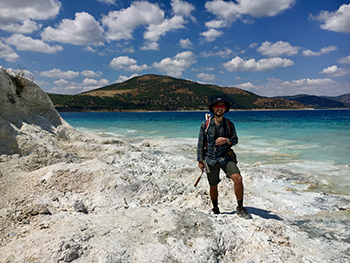The Role of a Turkish Lake in an EAPS Student’s Mars Research
09-12-2019
Writer(s): Logan Judy

Not all research happens in a lab. Particularly in the geosciences, scientists frequently travel to field locations to aid their research. Such was the experience of EAPS graduate student Bradley Garczynski, taking an eight-hour car ride after landing in Istanbul, Turkey. With funding awarded by the Lewis and Clark Fund for Exploration and Field Research in Astrobiology, Garczynski and the research team (including his advisor, Dr. Briony Horgan), traveled to Lake Salda, in an effort to better prepare for the landing of the 2020 NASA rover on Mars.
“I’m currently looking at analog environments on Earth for Jezero crater, the landing site for the Mars 2020 rover and the remnants of an ancient lake that existed over 3.8 billion years ago,” Garczynski said.
The 2020 Mars mission, while not the first rover to reach the red planet, will be the first to cache samples that will be brought back to Earth, arriving in the 2030s. It will also have, as Dr. Horgan told Popular Science last fall, “unparalleled ability to do high-resolution geology and astrobiology.” Garczynski aims to use his research to help guide the rover’s path and maximize the scientific return of the Mars 2020 mission.
“To really understand how the rover will best achieve its objectives, it’s very important that we look at similar environments on Earth. Part of this research has been actually going out into the field and trying to understand lake environments on Earth that may resemble what Jezero may have looked like billions of years ago.”
When researchers use rovers on the Martian surface, there’s a limit to the number and depth of the scientific activities that can be accomplished. The greater understanding scientists can gain by studying similar sites on Earth (called analogs), the better they can utilize their resources during the mission itself. This could result in direct application, in the case of Garczynski’s work – Dr. Horgan is a co-investigator for the Mastcam-Z imaging instrument on Mars 2020, which will act as the “eyes” for the rover. Garczynski is a student collaborator on the science team.
To accomplish this, he has pulled from previous orbital research on Jezero, which used remote sensing techniques to understand the mineralogy and rock types. One of these types of rocks, called carbonates, can contain clues to past history, including the presence of water and possible biosignatures, or signs of ancient microbial life. Understanding carbonates better on Earth can help answer questions about how to look for potential biosignatures on Mars.
“One of the questions I’m looking at is where do biosignatures typically occur in a modern carbonate lake on Earth? Where are they well-preserved? What are some diagnostic deposit types that the rover may encounter that would suggest they formed in the lake environment? How will we use rover instrumentation to identify potential biosignatures?”
That brings us back to Turkey. Garczynski was interested in Lake Salda because it is the only lake on Earth that contains carbonate minerals and a surrounding geology similar to those observed from orbit at Jezero. In collaboration with a team at the Istanbul Technical University, the team did a survey of the lake perimeter and surrounding area. Taking these samples will help them determine what deposit types are there and where the biosignatures are occurring. The results of that research, in turn, may impact the activities of the Mars rover itself. In the meantime, Garczynski will continue to investigate the results of their four days in the field, which he says will take about six months.
Garczynski is a second-year PhD student, anticipating graduation in 2023.